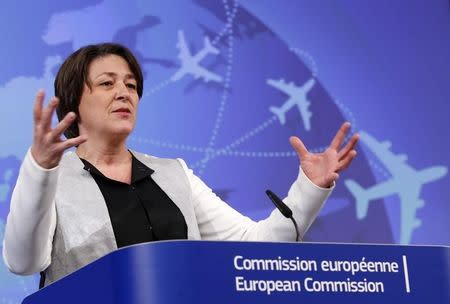EU wants to link road charging to trucks' CO2 emissions

By Julia Fioretti BRUSSELS (Reuters) - The European Commission wants to link road tolls to the CO2 emissions of trucks in proposals for reform of the European road-charging scheme next year to encourage more fuel-efficient vehicles, the bloc's transport chief said on Tuesday. Heavy duty vehicles (HDVs) account for a small fraction of vehicles on the road but are responsible for one-third of CO2 emissions in the European Union. EU Transport Commissioner Violeta Bulc said road charging could be very useful in the EU executive's efforts to reduce the carbon footprint of the transport sector. "If road charges were properly designed to reward the cleanest trucks, then road operators would undoubtedly be encouraged to buy these to remain competitive," she said at a conference. However, linking road tolls to CO2 emissions could face opposition from the industry, which has pointed to the difficulty of measuring emissions from HDVs. The Commission is preparing a package of measures on road transport for early next year, including a reform of its "Eurovignette" time-based charging scheme for road tolls. One idea would be to promote vehicles with low CO2 emissions by reviewing the differentiation of road tolls and looking at exemptions or rebates for innovative solutions, an EU official said. In addition the Commission has long stated it wants to move from a time-based toll system to a distance-based one. "If you want to achieve something in terms of incentivising greener or less-congested transport then go for distance-based or smart tolling," the official said. Industry group the European Automobile Manufacturers' Association (ACEA), which includes Volvo, Daimler and Volkswagen, said road charging systems should promote the use of cleaner vehicles by encouraging fleet renewal. In a position paper, ACEA said that adding greenhouse gas emissions as an external cost would amount to double taxation since these were already accounted for in fuel tax. (Editing by David Evans)

